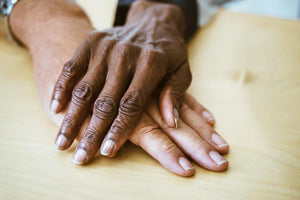Aging and Incontinence: There is a Link
April 07, 2020

Urinary incontinence, as you may be aware, is a loss of control of the bladder. It often results in urine leakage which, for many, can be incredibly uncomfortable and embarrassing. While people of all ages suffer from this condition, it is particularly significant among our senior population. In fact, according to WebMD “More than 50 percent of older Americans struggle with incontinence”.
Types of Incontinence
There are a number of types of urinary incontinence. Urge incontinence is, according to MedlinePlus, “ a strong, sudden need to urinate that is difficult to delay. The bladder then squeezes, or spasms, and you lose urine.” This condition can be caused by any number of things, including (but not limited to) bladder inflammation, brain or nerve problems or even bladder cancer.
Stress urinary incontinence results from pressure on the bladder. Leakage occurs when coughing, sneezing or even laughing. Common in women at the onset of menopause, one cause of stress incontinence is pregnancy and childbirth.
Overflow incontinence, as explained by WebMD, “occurs when you are unable to completely empty your bladder; this leads to overflow, which leaks out unexpectedly”. In addition to the embarrassing leakage, this type of incontinence often results in urinary tract infections.
A symptom of other afflictions, functional incontinence is not the result of an underlying bladder issue. Those who are affected by other illnesses (for example, arthritis) often move more slowly. Accessing restrooms quickly can be difficult and leakage may occur. This is prevalent in older individuals.
Why Do Older People Suffer?
As mentioned earlier, the elderly do suffer at a greater rate than the rest of the population. They are more likely to face mobility issues, have pelvic floor atrophy, prostate gland enlargement and weakened bladder muscles, or suffer from other illnesses including Parkinson's, Multiple Sclerosis and dementia.
And, while this is embarrassing for anyone affected, those who are older may become even more frustrated. Aging can be difficult under the best of circumstances. Much of life becomes more difficult. Adding incontinence to the mix can cause or heighten depression and anxiety.
Managing Incontinence
If your aging loved one is suffering, encourage them to speak with their physician. As we know, incontinence is often a side effect of other problems. Once the baseline issues are identified, ways to treat (for example, behavior modification, kegel exercises, or medical intervention) can be determined.
Additionally, by identifying the many products which can help manage the symptoms of incontinence, you can help those you love. At LIQUAGUARD® we provide a broad range of options that can help make life just a little bit easier.
AT LIQUAGUARD® WE UNDERSTAND THAT LIVING WITH INCONTINENCE CAN BE EXTREMELY DIFFICULT AT TIMES. ISSUES LIKE URINE LEAKS AND AN OVERACTIVE BLADDER ARE FRUSTRATING.
WE ARE PROUD OF THE PRODUCTS THAT WE PROVIDE. VISIT OUR WEBSITE TO LEARN LEARN MORE. AND, CALL US WITH ANY QUESTIONS.
WE ARE COMMITTED TO PROVIDING THOSE THAT SUFFER THE HIGH QUALITY PRODUCTS THEY NEED TO LIVE A MORE ENJOYABLE LIFE
Share:


